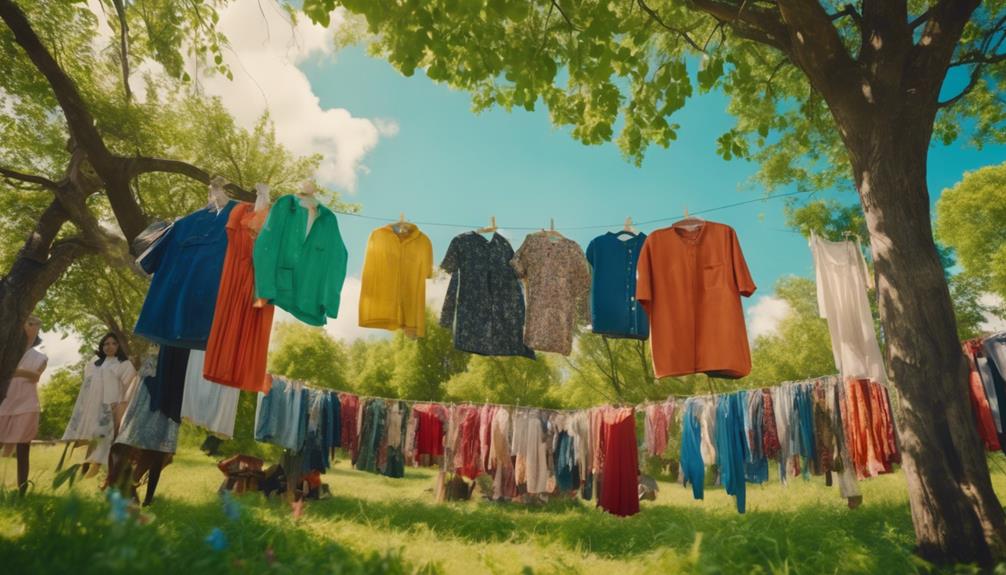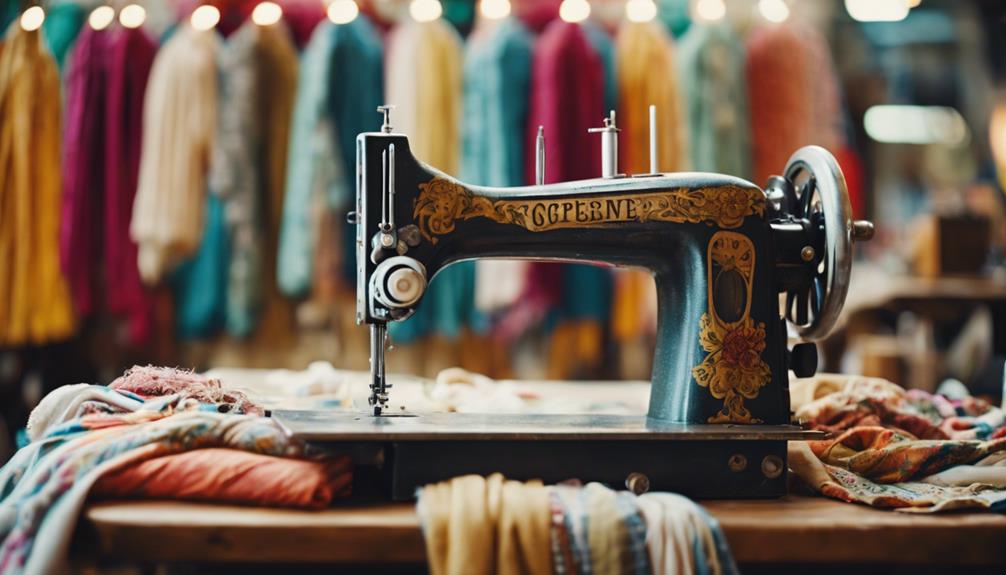Sustainable fashion is about creating clothing that benefits the environment and respects the workers who make them. Unlike fast fashion, which promotes disposable items, sustainable fashion emphasizes the use of eco-friendly materials and recycling. This includes selecting organic cotton, endorsing fair labor standards, and embracing secondhand shopping. By valuing quality over quantity, you can help decrease waste and minimize your carbon footprint. There is a growing demand for transparency in the fashion sector, which is prompting brands to adopt more sustainable practices. Interested in learning more about how sustainable fashion can create a greater impact?
Key Takeaways
- Sustainable fashion focuses on creating clothing with minimal environmental impact and ethical production practices.
- It prioritizes eco-friendly materials and promotes recycling and upcycling of garments.
- Unlike fast fashion, sustainable fashion advocates for quality over quantity and encourages long-lasting clothing.
- Consumers play a crucial role by choosing ethical brands and being aware of greenwashing.
Understanding Sustainable Fashion
Understanding sustainable fashion means recognizing its commitment to minimizing environmental impact and ensuring ethical production practices. As a consumer, you play a crucial role in this movement. When you choose to support sustainable fashion, you are making a conscious decision to prioritize quality, longevity, and responsibility. Fast fashion vs sustainable fashion is a crucial debate in today’s society, as the former often prioritizes mass production and low cost at the expense of environmental and ethical considerations. By educating yourself and making informed choices, you can help drive the fashion industry towards a more sustainable and ethical future.
Sustainable fashion emphasizes the use of eco-friendly materials and promotes circular economy principles, which focus on recycling and upcycling to reduce clothing waste.
In contrast to fast fashion, which encourages a throwaway culture, sustainable fashion prioritizes quality over quantity. This shift not only extends the lifespan of garments but also helps combat the alarming statistic that 60% of clothing items are discarded within a year. By choosing responsible fashion options, you contribute to a more sustainable future. Moreover, sustainable fashion promotes ethical practices that benefit both workers and the planet, ensuring that everyone involved in the production process is treated fairly. In contrast, the fast fashion environmental impact is severe, as it contributes to pollution and depletes natural resources at an alarming rate. By opting for sustainably made items, you play a crucial role in reducing this negative impact and fostering a more eco-conscious industry.
Increasing consumer awareness is driving this change, with many individuals, particularly millennials, now prioritizing sustainability in their shopping choices. They demand transparency and ethical production practices from brands, pushing the industry to adopt more sustainable methods.
The adoption of sustainable fashion isn't just a trend—it's a necessary shift toward a healthier planet. By embracing these principles, you can make informed decisions that align with your values and support the growing movement for a more sustainable and ethical fashion industry.
Importance of Sustainable Fashion

Sustainable fashion plays an essential role in addressing the fashion industry's environmental challenges and promoting ethical practices that protect both the planet and its workers. The fashion industry is responsible for 8% of global greenhouse gas emissions, considerably contributing to its environmental impact.
By choosing sustainable fashion, you can help reduce waste, as 60% of clothing ends up in landfills or incinerators within a year. When you prioritize quality over quantity, you support sustainable brands that focus on ethical production and fair labor practices. This guarantees garment workers receive living wages and work in safe conditions.
As consumers, you must recognize the importance of your choices; increased demand for sustainable options drives brands to adopt eco-friendly practices. If current trends continue, the fashion industry could consume 26% of the carbon budget by 2050.
Key Principles and Practices

Prioritizing natural and organic materials is a fundamental principle of sustainable fashion that helps minimize environmental harm. By choosing organic cotton and other natural materials, you support ethical fashion brands that prioritize the planet's health. These brands often focus on a responsible manufacturing process, ensuring high quality and longevity in their products.
Implementing zero waste design practices is another key aspect. This approach minimizes material waste and promotes durable clothing that stands the test of time. You can also contribute by engaging in secondhand shopping, which not only extends the life of garments but also reduces the demand for new production.
Additionally, sustainable fashion encourages you to care for your clothes, mending or altering items to prolong usability. By embracing these practices, you're actively reducing your environmental impact.
It's important to recognize that brands committed to sustainability may have higher prices due to their focus on living wages for workers and the quality of materials used. Certifications like Global Organic Textile Standard (GOTS) and OEKO-TEX can help you identify brands that genuinely uphold sustainable practices, ensuring your choices align with your values.
Consumer Influence on Sustainability

Your choices as a consumer play a pivotal role in shaping the fashion industry's shift toward sustainability. By prioritizing ethical and sustainable fashion, you join the sustainable fashion movement that seeks to reduce the negative impacts of fast fashion. Supporting local and ethical brands not only helps lower your carbon footprint, but it also encourages better environmental practices across the industry.
As an environmentally conscious shopper, it's crucial to be aware of greenwashing. Misleading labels can make it difficult to distinguish genuine sustainable brands from those merely hopping on the trend. By making informed choices, you can push for real change.
Embracing a mindset of quality over quantity is another way to create sustainable wardrobes. Instead of continuously buying fast fashion items, consider thrifting or renting clothing. This approach considerably reduces waste and promotes a more sustainable lifestyle.
Ultimately, your consumer influence can drive the demand for ethically produced clothing, shaping a more responsible fashion industry. By choosing wisely, you not only benefit yourself but also contribute to a healthier planet for future generations. Every decision you make today counts towards a more sustainable future.
Future of Sustainable Fashion

The future of fashion promises to be more eco-conscious as brands increasingly adopt sustainable practices to meet rising consumer demand. With 71% of millennials prioritizing sustainability, the industry is shifting towards innovative materials and production processes that minimize environmental impact. As fashion waste is projected to reach 148 million tons by 2030, brands are recognizing the urgent need for change.
Implementing a circular economy approach, many brands are exploring recycling and rental options, which reduce waste and resource consumption. You'll see more companies, like Patagonia, leading the charge by prioritizing sustainable practices and materials in their collections. This shift not only addresses waste but also enhances transparency, allowing consumers to make informed choices about the brands they support.
As you navigate this evolving landscape, know that sustainable fashion is becoming a competitive advantage for brands. The demand for accountability is driving industry-wide changes, leading to a more responsible fashion ecosystem. By supporting these initiatives, you're not just making a style statement; you're contributing to a healthier planet and a more sustainable future for the fashion industry.
Frequently Asked Questions
What Is Sustainable Fashion in Simple Terms?
Sustainable fashion means choosing clothes that are eco-friendly and ethically made. It focuses on using materials that harm the environment less and promotes practices like recycling and upcycling, helping you make more responsible fashion choices.
What Is the Point of Sustainable Fashion?
The point of sustainable fashion is to reduce environmental harm while promoting ethical practices. It encourages you to choose quality over quantity, supporting a healthier planet and fostering a responsible consumer culture that values longevity in clothing.
What Is Sustainable Fashion for Kids?
Sustainable fashion for kids means choosing clothes that are eco-friendly and promote fairness. You can swap outfits with friends, pick quality pieces, and support eco-conscious brands, helping the planet while expressing your unique style.
How Do You Use Sustainable Fashion in a Sentence?
You might say, "I bought a beautiful dress from a sustainable brand like Reformation, which uses eco-friendly materials." This highlights how sustainable fashion positively impacts both your wardrobe and the environment, making ethical choices fashionable.
Conclusion
So, you see, embracing sustainable fashion isn't just about wearing eco-friendly clothes; it's about making choices that reflect your values.
Isn't it ironic that by opting for a simple, ethical wardrobe, you're actually contributing to a complex global solution?
Every time you skip fast fashion for something sustainable, you're not just dressing yourself—you're rewriting the future.
Who knew that looking good could also feel this good?
Let's make fashion a force for positive change, one outfit at a time!









